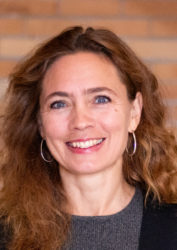
Dear Foundry Community,
As spring tentatively flirts with the Bay Area, we have almost come full circle to the first lock-down from March 2020. The Foundry continues to navigate the shifting landscape of the ongoing pandemic and despite the recent limitations posed by the statewide stay at home order (lifted January 26), 2021 has been off to a busy start.
Several Foundry staff have been deeply involved in the long term planning effort for ‘Charter Hill’, a site at Berkeley Lab formerly known as Old Town, where there is a once-in-a-generation opportunity to plan a novel, integrated cluster of buildings that leverage leading-edge concepts in materials and chemical discovery science. The vision for these buildings models much of what has made the Foundry successful – co-located researchers from a variety of backgrounds working in collaborative facilities that link theory, synthesis, fabrication, and characterization. The recently concluded Charter Hill workshop series enabled Foundry staff and users to contribute to the science vision for the three prospective buildings. I encourage you to take a look the reports on the outcomes of those sessions.
Gathering dynamic perspectives is an important part of envisioning the future of research. As the Foundry seeks to maintain our place as an essential nanoscience resource, we strive to ensure that we get feedback from a variety of sources. Earlier this year we welcomed Sarbajit Bannerjee as the new chair of our User Executive Committee (UEC), as well as three newly elected members who are listed on the UEC website. We have also completely renewed the Foundry’s Scientific Advisory Board (SAB) and spent a few days getting them acquainted with our staff, current research, and possible future directions including automated high-throughput materials discovery, quantum information science, AI & Machine Learning, and Electron Microscopy. The SAB members are: Dr. Andy Cooper (University of Liverpool), Dr. Waguih Ishak (Corning), Dr. Michael Jewett (Northwestern), Dr. Steve Kevan (ALS/Berkeley Lab), Dr. Bryce Meredig (Citrine Informatics), Dr. Michael Mills (Ohio State), Dr. Thuc-Quyen Nguyen (UCSB), Dr. Monica Olvera de la Cruz (Northwestern), Dr. Amanda Petford-Long (Argonne National Lab), Heilke Riel (IBM), and Dr. Ursula Wurstbauer (Münster University). We are grateful and thrilled to have such a distinguished group of scientists, of broad and diverse expertise, supporting us.
We are also excited to bring back our Foundry Seminar Series in a virtual format with an impressive group of 10 distinguished speakers. One of the silver linings of the expansion of remote work and virtual events is the ability to connect a geographically diverse audience in a single forum to exchange ideas. The series, which began in January, continues through March 23.
For much of the past few months, Berkeley Lab has been operating at a reduced capacity but as case rates in the area decline, we are hopeful that more people will be allowed onsite soon and that we resume some of the in-person interactions that makes the Foundry so special and science so much fun. Since last summer, our shiftwork schedule has allowed approximately 70 people to be onsite at the Foundry each day, yet we have not had any cases of onsite transmission at the Foundry or at Berkeley Lab (and only 48 total cases to date), which is a tremendous achievement and speaks to the care that our staff and users are taking to work safely. The Lab continues to monitor the situation and is developing procedures to allow more people onsite while keeping them safe. Weekly testing is now available for staff and users who work onsite on a regular basis. More information is available on Berkeley Lab’s website. We appreciate your continued patience and cooperation.
Finally, I want to briefly mention that we have had a number of papers accepted to high impact journals, including one Nature cover, in recent months. Keep an eye on the Foundry website to stay up to date with news on our latest work. This is a testament to the quality of work being conducted by our staff and users and the spirit of innovation that persists even though our collaborations involve more distance than before. You can learn about what our staff is doing to enable remote, virtual, and distanced user access through our new Foundry from Home podcast. If you have new ideas that could be pursued at the Foundry, our Spring proposal call just opened and we’ll be accepting proposals through April 1, 2021.
All the best,
Kristin
View the Winter Newsletter

